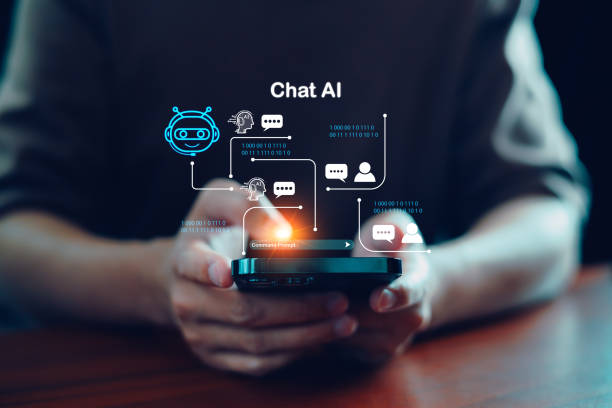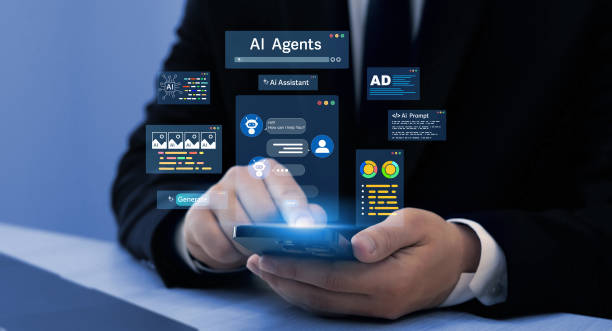What is an AI Robot and How Does it Work?
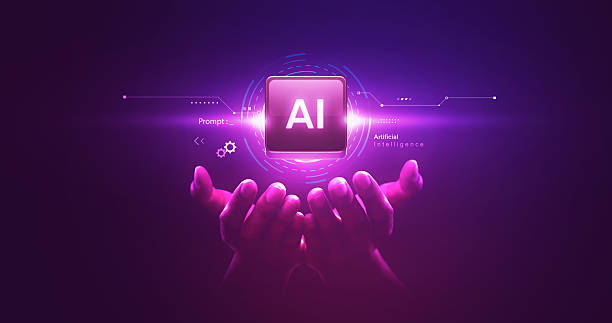
#AI_Robot (Artificial Intelligence Robot) is a combination of two distinct fields: #Artificial_Intelligence and #Robotics.
Simply put, an AI robot is a physical or virtual robot controlled by artificial intelligence algorithms.
These algorithms allow the robot to learn from its environment, make decisions, and perform various tasks without direct human intervention.
AI robots are used in various industries, including manufacturing, healthcare, customer service, and even entertainment.
In fact, an AI robot strives to mimic human-like functions.
#AI_Robots can learn, solve problems, and make complex decisions.
How an AI robot generally works includes the following steps:
- Sensing: The robot collects information about its surroundings through various sensors such as cameras, microphones, touch sensors, etc.
- Processing: The information collected by the sensors is processed by the robot’s processors using artificial intelligence algorithms.
In this stage, the robot tries to understand its environment and identify existing patterns and relationships. - Decision-making: Based on the processed information, the robot decides what to do.
This decision-making can include movement, object manipulation, answering questions, and so on. - Execution: After making a decision, the robot performs the desired action using its actuators such as motors, arms, etc.
- Learning: The robot continuously learns from its experiences and improves its algorithms.
This learning can be done automatically or with human assistance.
With this mechanism, the AI robot continuously senses, analyzes the environment, and proceeds to perform its tasks.
Is your company’s website as professional and trustworthy as it should be? With expert corporate website design by Rasawab, create an online presence that reflects your credibility and attracts more customers.
✅ Build a powerful and professional image for your brand
✅ Convert visitors into real customers
⚡ Get a free consultation now!
Types of AI Robots and Their Applications
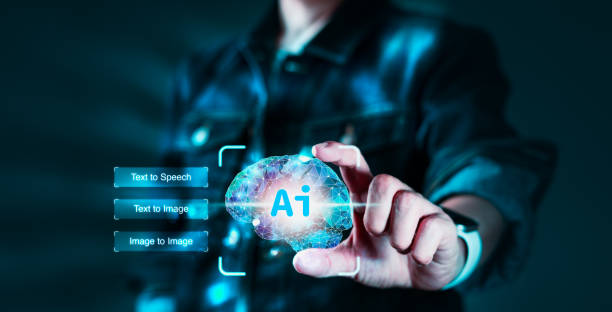
AI robots can be categorized based on various criteria, including:
- Body Type: Physical robots (such as industrial robots, home robots, and drones) and virtual robots (such as chatbots and voice assistants)
- Movement Type: Stationary robots (such as assembly robots in production lines) and mobile robots (such as transport robots and search and rescue robots)
- Application Type: Industrial robots, medical robots, home robots, military robots, and so on
Some of the most important applications of AI robots include:
- Industry: #Automation of production lines, quality inspection, material handling
- Healthcare: Robotic surgery, rehabilitation, remote nursing
- Customer Service: Chatbots, answering phone calls, providing information
- Agriculture: Crop harvesting, spraying, irrigation
- Military: Reconnaissance, bomb disposal, equipment transport
- Home: Robotic vacuum cleaners, robotic lawnmowers, elderly care
#AI_Robots are rapidly advancing and are expected to play a much more significant role in our lives in the future.
The widespread use of AI robots has led to many transformations in industry and daily life.
Advantages and Disadvantages of Using AI Robots
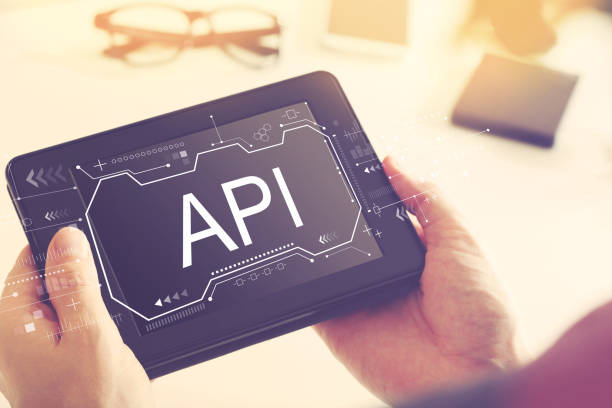
The use of AI robots has many advantages, including:
- Increased Productivity: Robots can work continuously and without fatigue, thereby increasing productivity.
- Cost Reduction: Robots can reduce labor costs and also prevent errors and waste.
- Improved Safety: Robots can work in hazardous and high-risk environments, preventing harm to humans.
- High Accuracy and Speed: Robots can perform tasks with much higher accuracy and speed than humans.
However, the use of AI robots also has disadvantages, including:
- High Initial Cost: Purchasing and setting up robots can be expensive.
- Need for Expertise: Expertise is required for programming, maintaining, and repairing robots.
- Job Displacement: The use of robots can lead to job losses for some individuals.
- Ethical Issues: The use of robots in some areas can raise ethical concerns, such as the use of military robots or robots that make important decisions in human lives.
Despite the disadvantages, the benefits of using #AI_Robots generally outweigh them, and widespread use of this technology is expected in the future.
| Advantages | Disadvantages |
|---|---|
| Increased Productivity | High Initial Cost |
| Cost Reduction | Need for Expertise |
| Improved Safety | Job Displacement |
| High Accuracy and Speed | Ethical Issues |
Challenges Facing the Development of AI Robots
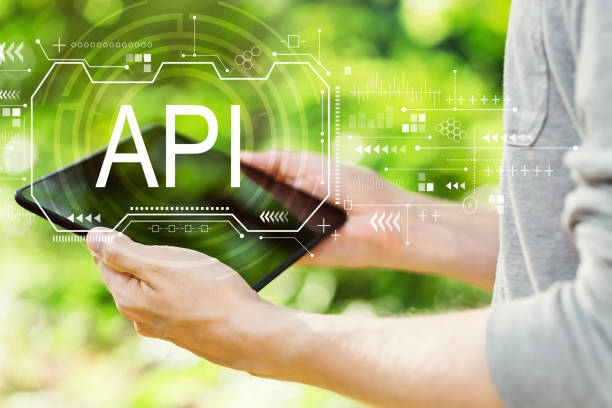
The development of AI robots faces numerous challenges, including:
- General Intelligence: Robots still cannot reach the level of human general intelligence and face difficulties in performing complex and unexpected tasks.
- Natural Language Understanding: Natural language understanding by robots is not yet fully resolved, and robots encounter difficulties in comprehending abstract concepts and colloquialisms.
- Learning: Robot learning still requires a lot of data, and robots cannot learn from their experiences as effectively as humans.
- Ethics: Ethical issues related to the use of robots are not yet fully resolved and require further discussion and debate.
- Security: Robots can be hacked and exploited, so robot security must be taken seriously.
Overcoming these challenges requires the efforts and cooperation of researchers, engineers, policymakers, and other stakeholders.
Addressing these challenges will help further develop AI robots.
Does your current e-commerce website design lead to lost customers and sales?
Rasawab is your solution with modern and user-friendly e-commerce website designs!
✅ Significantly increase conversion rates and sales
✅ Build strong branding and attract customer trust
⚡ Get a free e-commerce website design consultation from Rasawab now!
What Will Be the Future of AI Robots?
![]()
The future of AI robots looks very bright and promising.
Significant advancements are expected in this field in the future, including:
- Smarter Robots: Robots will be able to perform more complex tasks and make better decisions.
- Increased Human-Robot Collaboration: Humans and robots will work together, complementing each other’s abilities.
- Expanded Robot Applications: Robots will play a more prominent role in various industries and our daily lives.
- Robot Personalization: Robots will be able to meet the specific needs of each individual.
- Creation of Self-Aware Robots: It is possible that self-aware robots will be created in the future.
However, it should also be noted that the development of AI robots must be carried out with ethical and social considerations to prevent potential problems.
The future of AI robots depends on paying attention to the various aspects of this technology.
How AI Robots Change Our Lives

AI robots have the potential to change our lives in various ways, including:
- Improved Quality of Life: Robots can help us with daily tasks, freeing up our time and energy.
- Increased Longevity: Robots can play a significant role in caring for the elderly and sick, helping to increase people’s lifespan.
- Creation of New Opportunities: Robots can create new opportunities in various fields, including employment, education, and entertainment.
- Solving Global Problems: Robots can play a significant role in solving global problems such as climate change, hunger, and diseases.
However, it should also be noted that the use of robots can also bring challenges, such as job displacement for some individuals and increased inequality.
To fully benefit from robots and avoid their challenges, we must actively participate in the development and use of this technology.
#AI_Robots can improve various aspects of our lives and create positive transformations.
The Role of AI Robots in Industry
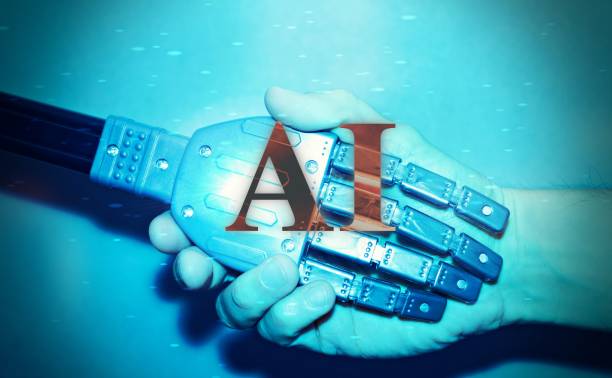
AI robots are creating significant transformations in industry.
Some of the main applications of AI robots in industry include:
- Automation of Production Processes: Robots can fully automate production processes, increasing productivity and quality.
- Quality Control: Robots can inspect products accurately and quickly, preventing errors and waste.
- Material Handling: Robots can safely and efficiently transport materials within and between factories.
- Performing Hazardous Tasks: Robots can perform dangerous and high-risk tasks, preventing harm to humans.
The use of AI robots in industry has many advantages, including increased productivity, reduced costs, improved safety, and increased quality.
Widespread use of this technology in industry is expected in the future.
#AI_Robots, as a powerful tool in industry, play a significant role in improving processes and increasing efficiency.
| Application | Description |
|---|---|
| Automation | Automating production processes |
| Quality Control | Accurate and fast product inspection |
| Transportation | Safe and efficient material handling |
| Hazardous Tasks | Performing high-risk duties |
The Impact of AI Robots on the Job Market

AI robots will have a significant impact on the job market.
On one hand, robots can eliminate some jobs, especially those that are repetitive and routine.
On the other hand, robots can also create new job opportunities, especially those requiring specialized skills and creativity.
#AI_Robots are changing the nature of work and the skills required in the job market.
To benefit from the positive impacts of robots on the job market and prevent negative ones, we must actively invest in training and educating skilled workers.
Additionally, we must develop policies that support individuals who lose their jobs.
Investing in education can also help create jobs in the field of AI robots.
Does your company’s website create a professional and lasting first impression in the minds of potential customers? Rasawab, with professional corporate website design, not only represents your brand’s credibility but also opens a path for your business growth.
✅ Create a powerful and reliable brand image
✅ Attract target customers and increase sales
⚡ Get a free consultation
Ethical Issues Related to AI Robots
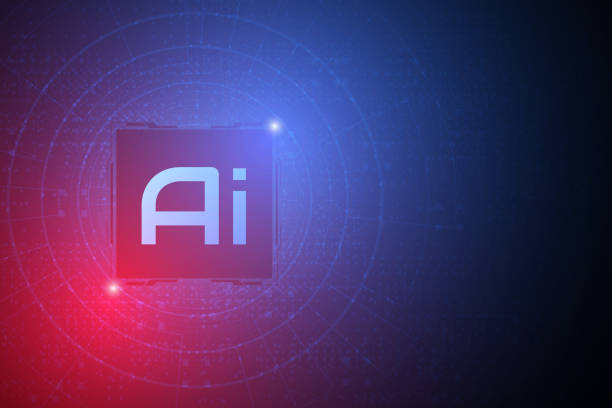
The use of AI robots raises numerous ethical issues.
Among the most important of these issues are:
- Accountability: Who is responsible for the decisions and actions of robots? If a robot causes harm to someone, who will be held accountable?
- Privacy: Robots can collect a lot of information about us.
How can we protect our privacy from robots? - Bias: AI algorithms can be biased and promote discrimination.
How can we prevent this? - Security: Robots can be hacked and exploited.
How can we ensure the security of robots?
To resolve these ethical issues, extensive discussion and deliberation are needed among researchers, engineers, policymakers, and other stakeholders.
We must enact laws that regulate the ethical and responsible use of robots.
Paying attention to these issues helps in the proper use of AI robots.
#AI_Robot is a phenomenon that must be considered from various angles.
Will AI Robots Replace Humans?

This is one of the common questions about AI robots.
The answer to this question is complex and depends on various factors.
Generally, it can be said that robots cannot fully replace humans, but they can play a more prominent role in certain areas.
#AI_Robots are very good at performing repetitive and routine tasks, but they perform weaker in tasks that require creativity, empathy, and emotional intelligence.
Robots can help in various aspects but will not become human.
It seems that in the future, we will see more collaboration between humans and robots.
Humans can use robots to perform difficult and repetitive tasks, while focusing themselves on creative and strategic work.
This collaboration can lead to increased productivity and improved quality of life.
#AI_Robots and humans can achieve great goals together.
Frequently Asked Questions
| Question | Answer |
|---|---|
| What is an AI robot? | An AI robot (Artificial Intelligence Robot) is a machine capable of understanding its environment, reasoning, learning, and making decisions to perform tasks autonomously. |
| What is the difference between regular robots and AI robots? | Regular robots perform repetitive tasks based on prior programming, whereas AI robots can learn from experience, interact dynamically with their environment, and even behave in a way that resembles human intelligence. |
| What are the main applications of AI robots? | They are used in industries (manufacturing, assembly), medicine (surgery, diagnostics), services (customer support, domestic), exploration (space, underwater), and many other fields. |
| What technologies are used in building AI robots? | Machine Learning, Computer Vision, Natural Language Processing, Deep Learning, and Robotics are among the key technologies. |
| Can AI robots have emotions? | Currently, robots do not have emotions in the human sense. They can identify and react to emotions, but they do not experience them themselves. |
| What are the main challenges in developing AI robots? | Safety, reliability, ethics, autonomy, adaptability to complex environments, and natural human interaction are among the important challenges. |
| How are AI robots trained? | They are typically trained using large volumes of data, machine learning algorithms, and deep learning to identify patterns and make decisions. |
| Examples of AI robots in daily life? | Smart robotic vacuum cleaners, customer support chatbots, self-driving cars, and surgical robots in hospitals. |
| Are AI robots a threat to human jobs? | Some repetitive jobs may become automated, but at the same time, robots can increase productivity and create new jobs in the development, maintenance, and supervision of these systems. |
| How is the future of AI robots predicted? | They are expected to become smarter, more autonomous, and capable of performing more complex tasks, engaging in closer interaction with humans in various environments. |
And other advertising services of Rasa Web advertising agency
- Smart Custom Software: Professional optimization for customer behavior analysis using attractive UI design.
- Smart Google Ads: Designed for businesses looking to increase click-through rates through optimizing key pages.
- Smart Marketplace: A combination of creativity and technology for campaign management through marketing automation.
- Smart Digital Branding: Designed for businesses looking to manage campaigns through optimizing key pages.
- Smart Social Media: Transform online growth with custom user experience.
And hundreds of other services in the field of internet advertising, advertising consulting, and organizational solutions
Internet Advertising | Advertising Strategy | Advertorial
Resources
Smart Robots: Our Future
Complete Guide to Building an AI Robot
Artificial Intelligence in Robotics: A Comprehensive Review
An Introduction to the World of Smart Robots
? To reach the pinnacle in the digital world, Rasawab Afarin Digital Marketing Agency paves the way for your business success by providing comprehensive services including professional website design, SEO, and online advertising.
📍 Tehran, Mirdamad Street, next to Bank Markazi, Southern Kazeroun Alley, Ramin Alley No. 6

